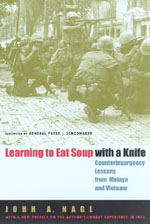A question and answer session with Lt. Col. John Nagl

In the Washington Post‘s recently published Q&A session with Lt. Col. John A. Nagl, Nagl uses his expertise in U.S. counterinsurgency operations to respond to reader’s questions regarding the future of the U.S. military presence in the Middle East. Nagl is author and contributor to several recent books on military counterinsurgency strategy including Learning to Eat Soup with a Knife: Counterinsurgency Lessons from Malaya and Vietnam and The U.S. Army/Marine Corps Counterinsurgency Field Manual. He also currently commands the 1st Battalion, 34th Armor at Fort Riley, Kansas. From the Washington Post:
Little Rock, Ark.: We don’t get much information regarding the nation-building activities in Afghanistan. Did we meet the rebuilding commitments we made to them when we won the war there?
Lt. Col. John Nagl: Little Rock, the counterinsurgency campaign in Afghanistan has not received the attention it has deserved. I visited there a little more than a year ago, and was struck most by the abject poverty of the country, even in Kabul. Afghanistan is the fifth-poorest country in the world after three decades of war. It desperately needs international assistance, particularly infrastructure development (roads above all). The Taliban’s resurgence has made the development work even harder than we’d anticipated. We still have a lot of work to do there, and I’m pleased that we have decided to commit additional combat forces to Afghanistan next year, as have some of our allies.
Santa Monica, Calif.: What is your take on the newly released report by Pentagon think tank National Defense University’s National Institute for Strategic Studies…?
Lt. Col. John Nagl: Santa Monica, the INSS report you reference was written by Col. Joe Collins (Ret.), a good friend and mentor. Press reports on it were somewhat out of context; Joe published a rejoinder on the excellent “Small Wars Journal” Web site (which I commend to anyone interested in the defense community’s discussion of counterinsurgency).
That said, there were serious mistakes made early on in Iraq; the decisions to disband the Iraqi Army and to radically de-Baathify the country made the insurgency far stronger than it might have been, and made the tasks of rebuilding the country and recreating the Army harder. However, those mistakes do not mean that we cannot help Iraq become a reasonably stable state that can control what happens within its own borders and that does not present a threat to the region, although doing so will take continued American commitment for a number of years.
Read the rest of the conversation on the Washington Post website.
Also see an excerpt from Learning to eat Soup with a Knife or read Nagl’s foreword to the Counterinsurgency Field Manual.